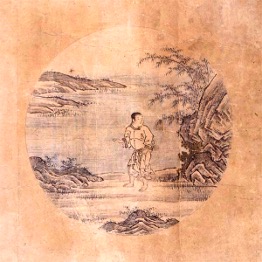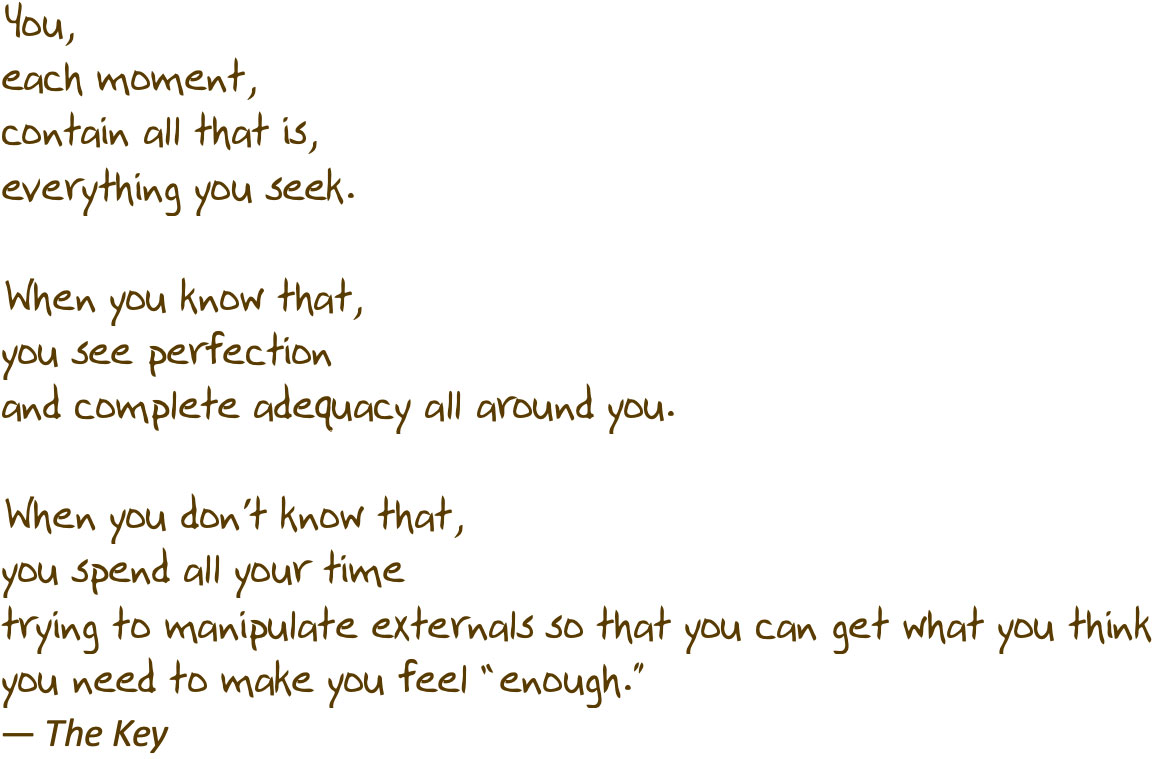For how can you really be here
saying hello to each moment
without a goodbye
on the tip of your tongue?
— Rumi
In these verses, Rumi reminds us that impermanence, “that brutal, beloved teacher,” is an organizing principle of existence. All formations are transient, forms of practice being no exception. After 10 years of reflecting on Practice principles Musings is taking on a different shape.
The shape?
A device used to deepen meditation is the contemplation of texts. The outpouring of sages—the haiku of Basho, the devotional songs of Mira, the ecstasy of Teresa of Avila, the wise words of Nisargadatta Maharaj, the poems of Rabia—invite us to perceive the world from an awakened point of view. As we sit with a text, we learn to let an expanded awareness reveal a perspective that ordinary mind cannot grasp. In an instant of insight we catch a glimpse of a vastness that leaves us thirsty for constant contact with Clarity. And so this year’s Musings experiments with revelation through a textual framework known to many either as “The 10 Bulls” or the “The Ten Ox Herding Pictures.”
A note about The Ten Ox Herding Pictures
There are ten images, each paired with a verse. There is a suggested order to the images, but since the spiritual trajectory is not linear, any image mirrors where we are in our practice at any given time.
The text quoted in these articles is a translation from the original by Nyogen Senzaki; the images are by the Zen monk painter, Tenshō Shūbun.
The Search for the Ox

In the pasture of this world,
I endlessly push aside the tall grasses in search of the ox.
Following unnamed rivers, lost upon the inter-penetrating paths of distant mountains,
My strength failing and my vitality exhausted,
I cannot find the ox.
I only hear the cicadas chirring through the forest at night.
A humid Sunday morning…
A small group gathers to listen to a lecture on the history of worship at the local temple. The entrance gate soars above us, a sublime monument to the imagination of an ancient civilization. A profusion of intricate and colorful sculptures of gods and goddesses, demons and saints and scenes from scriptures and daily life adorn the seven tiers of the lofty structure. Among the miniature friezes are life-size carvings of the guardians of sacred spaces. Disinterested in the narrative of their times, their curious and watchful gaze is trained on the square below. What was once a lush forest of laurel trees is now a shopping center housing commercial concerns related to the temple. There is litter everywhere, the detritus of construction—rubble, blocks of concrete, metal wire, PVC pipes intermingle with scraps of newspaper, plastic packaging, garlands, heaps of dirt. The street is a hive of activity, thronged by street vendors, flower sellers, devotees, beggars, the homeless asleep on cardboard, children playing, priests, tourists, motorbikes, cars, three-wheelers, cycles, feral cats, street dogs and the occasional cow. Through the cacophony of temple bells, devotional chants, a loudspeaker blaring mantras, snatches of animated conversation and the strident ringtones of cellphones we strain to hear what the tour guide has to say about the devotion that inspired this beautiful piece of architecture.
Unlike the guardians observing this scene with dispassionate curiosity from their lofty perch, this practitioner is recoiling at being confronted by the collision of the sublime and profane, ancient beauty and modern ugliness, flowers and excrement, poverty and excess, indifference and piety. Instead of being completely engaged in this vivid theatre of life, I am miserable, attention on an internal commentary, ranting and raving at the display of unconsciousness at a place of worship.
“Receptivity not resistance,” says the still small voice.
“Count the breath,” counsels the Mentor.
Attention wanders.
“That guy just spit on the ground!”
Coming back to one.
“Why come to a lecture if you want to talk on the phone?”
Coming back to one.
“How can we hear above the din? Can’t they provide a microphone that works!”
Coming back to one.
“You are not being the change you want to see in the world.”
Coming back to one.
Don’t shove me!
I struggle to practice custody of the attention. It is challenging to stay with the breath, hard not to lose the thread of the count, impossible to drop the conversation.
Where is that ox? Why can’t I find it?
Just as I am about to concede defeat and give in to complete identification, I glimpse an old woman sitting on the dusty steps of a barricaded shop. Something about her quiet dignity catches the attention. Wrapped in a parrot green sari with large red flowers, her luminous eyes taking in the scene, she radiates a serene acceptance. It drops in, “She is not searching for the ox.”
The first Ox Herding Picture, the subject of my koan practice for weeks, begins to reveal its teaching.
![]()
A feeling of something missing propels a search for what is perceived to be absent. But the process of seeking is distinct from the process of finding. Seeking is attention on what’s not here. Finding is attention on what is. As long as one is searching for any “thing,” that thing remains elusive. As we often say in Practice, “one process does not lead to another.” Peace is always here, in the quiet inner sanctum or the outer courtyard of the temple. Attention can be on the absence of peace, or its presence.

Every search is directed toward an object. It is specious reasoning that the object (project, person, hobby, place, activity) delivers the experience that is sought. To believe that my experience is a result of acquiring something out there is to be doomed to wander in the pasture of the world, strength failing and vitality exhausted. As the chirring cicadas teach, contentment is a state of being, not doing. On the other hand, dissatisfaction is the inevitable result of pursuing fulfillment where it cannot be found. However, until we are exhausted by the search, we don’t seem to be able to accept that meaning, purpose, belonging, companionship, security, relevance, understanding, status, adventure, comfort, expression are mere substitutes for “the joy of Intelligence knowing itself.” As the Guide writes…

Gasshō
ashwini
Audio of this month's Musings:
Download (right-click to download)
Subscribe to the audio version of Musings as you would any podcast. Add this feed URL to your podcast app:
https://www.livingcompassion.org/feed/musings/podcast-feed.rss
